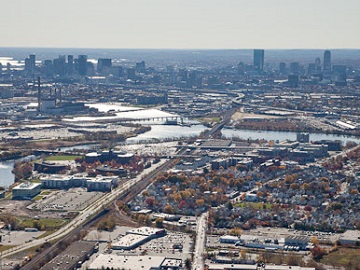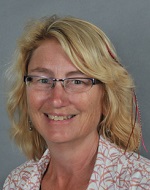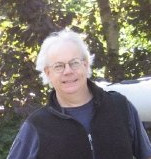Apply now to join our next cohort of Community Science Fellows and Community Leads!

Final Project Summary: Assessing Flood Risk of Food Distribution Centers
The primary objectives of this project were to build upon existing analyses of the region’s food system and climate vulnerabilities to identify flood risk exposure to the food distribution centers in Chelsea and Everett, Massachusetts in the greater Boston area. Chris Watson and Ellen Douglas were chosen by the Metropolitan Area Planning Commission (MAPC) lead, Axum Teferra, to collaborate with them to inform MAPC and the Metro Boston Climate Preparedness Taskforce of addressing the flood vulnerabilities of this critical regional food distribution infrastructure.
The MAPC-TEX project on “Assessing Flood Risk of Food Distribution Centers” completed in December 2016. To accomplish the project’s objectives, Watson, Research Fellow at UMass Boston, based the project’s results on the Massachusetts Department of Transportation’s Boston Harbor Flood Risk Model (BH-FRM). The BH-FRM used dynamic modeling techniques that incorporated storm surge, wave action and sea level rise projections under different climate scenarios. By using BH-FRM results, this project’s methodologies were aligned wtihother regional analyses. Further, he leveraged the results of a complementary study by Stantec/Woods Hole Group for the City of Chelsea and a design study by Climate Creatives to expand the project to include various adaptation options.
The final project outcome is a poster developed by the team for the meeting of the American Geophysical Union in December 2016. It was presented by Axum Teferra.
The project concluded the following:
The team learned a few key lessons:
For scientists who would like to become part of a future TEX project and have questions about how much time is required for a project like this one, Watson expressed that he spent from 2to 10 hours a week from its mid-February 2016 start until its December 2016 completion.
If you are interested in learning more about specifics of this project and how you might replicate this process in your community, please contact Chris Watson, Research Fellow, University of Massachusetts – Boston at [email protected] or Axum Teferra, Energy Planner, MAPC at [email protected].
More information available:
The Metro Boston region, an area where civic leaders have been at the forefront of climate resilience initiatives in recent years, is undergoing a comprehensive flood vulnerability assessment of its food distribution networks north of Boston. Much of the metro region’s food supply passes through two major distribution centers in the cities of Everett and Chelsea, just north of the Mystic River. The Metro Boston Climate Preparedness Taskforce, made up of 14 inner core cities and towns, as well as state, regional, and federal agencies, is organized through the Metropolitan Area Planning Council (MAPC). MAPC found two scientific partners who can build upon existing analyses of the region’s food system and climate vulnerabilities to develop a comprehensive report identifying flood risk exposure to the food distribution centers in Chelsea and Everett and their larger regional implications.

During the April check-in call with TEX, the Metropolitan Area Planning Council (MAPC) team conveyed that it has kept in very close contact with Chris Watson since the introductory call in February 2016. Regardless of whether they have information to convey, Axum Teferra (MAPC) has been organizing brief weekly update calls to keep all parties organized and informed. Chris Watson (University of Massachusetts) and Martin Pillsbury (MAPC) agree that having a 5-to-30-minute conversation each Friday has kept them in tune with the needs of the project and helped them prioritize their action items for the following week.
The team is pleased to report that they have received a large amount of data from the City of Chelsea on saltwater flooding, which includes the food distribution center. A consultant, hired by the city of Chelsea, has performed a vulnerability assessment which increased their data pool immensely. Axum attributes their success in collecting this data to the scientists’ being local and understanding the local context. Both Dr. Ellen Douglas (University of Massachusetts) and Mr. Chris Watson have worked in the Boston area for many years. Therefore, their connections to local groups (such as the Woods Hole group and Stantec) ensure that they share data freely and without hesitation.
Currently, the team requires technical freshwater flooding data. The expectation is that Teferra will obtain this data using MAPC’s connection with the Department of Environmental Protection. Once MAPC makes a connection with the City of Everett, Watson anticipates doing a site traverse of the food distribution center. This site traverse will give him the opportunity to take pictures and extrapolate conclusions from visual evidence. The results of these efforts should be apparent by the next TX check-in call in May.
As an added bonus to this project, the Dutch Consulate is interested in providing assistance. They have a partnership with the City of Boston and a strong history and interest in water issues. Once the vulnerability report is nearly finished (in late summer/early fall 2016), the consulate intends to connect with the MAPC team and assist them with strategic planning.
Axum Teferra joined the Clean Energy Division of MAPC in December 2014. As an Energy Planner, Axum is focused on renewable energy generation initiatives and on MAPC’s development of a regional climate preparedness and resiliency plan. Her areas of expertise include Climate preparedness and resiliency, renewable energy generation, cleantech innovation, energy efficiency, and climate equity.

Dr. Ellen Douglas is a hydrologist, an engineer, and an associate professor at University of Massachusetts Boston. Her research utilizes computer modeling and data analysis to define and support sustainable management policies and practices related to water resources and climate change adaptation.

Chris Watson is a research fellow with the School for the Environment at University of Massachusetts Boston. His areas of interest focus around sea level rise and coastal flooding. He holds a particular interest in the applicability of his research to predict flood impacts in Boston in the coming century.
(c) 2024 Thriving Earth Exchange